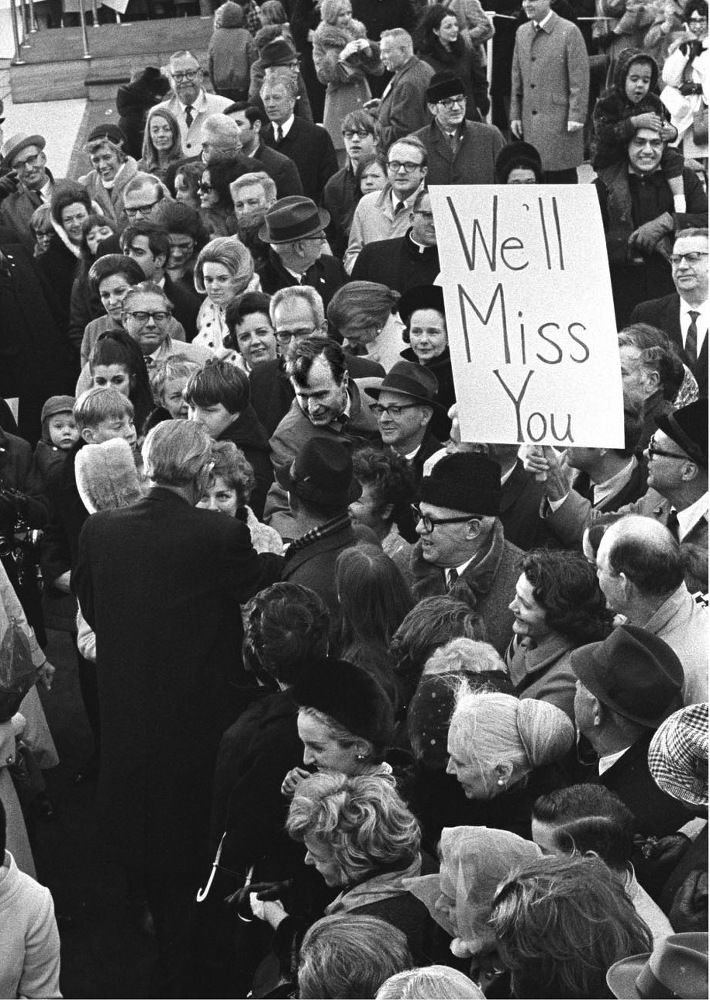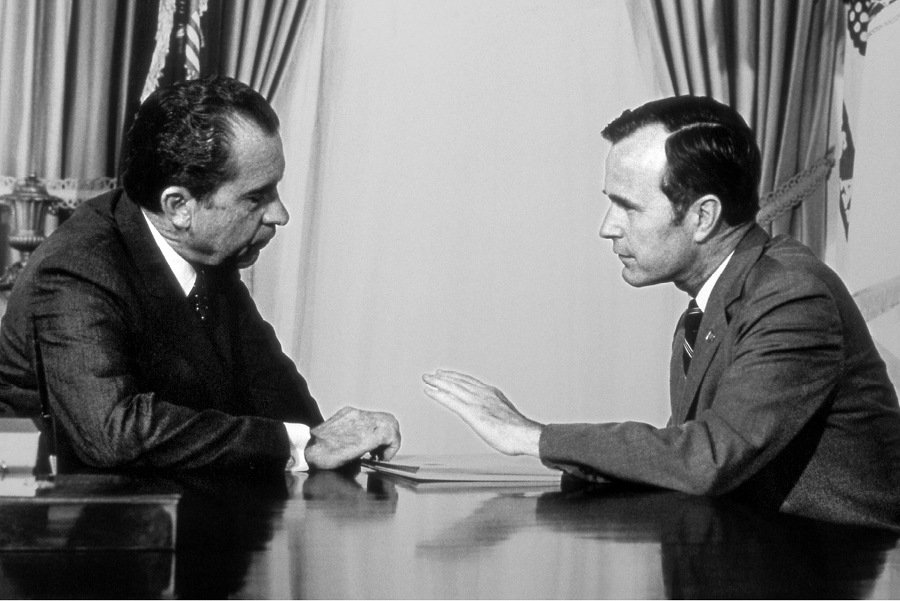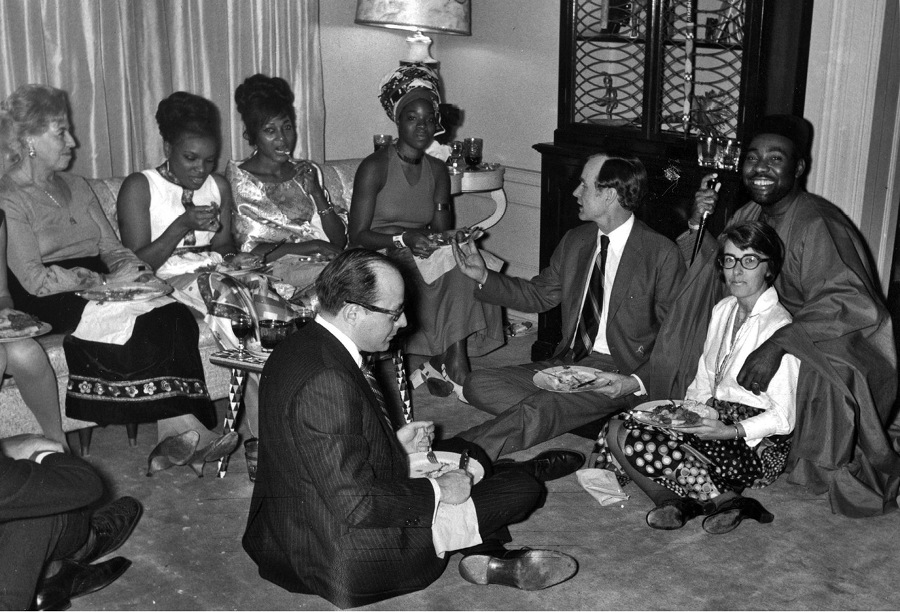
I kept a copy in the Oval Office of this 1949 photo of Mother and Dad and his parents, Dorothy and Prescott Bush, in Odessa. I have always been grateful to George and Barbara Bush for raising me in West Texas. GBPLM

Some of my warmest memories of our West Texas years are of the times I spent with Dad. As my brother Jeb put it, “He invented quality time.” GBPLM

In Midland with Dad, my grandmother, and my sister, Robin, in 1953. Before Robin died of leukemia later that year, she told Dad, “I love you more than tongue can tell.” GBPLM

With Dad at the christening of “the Scorpion,” his company’s revolutionary offshore oil rig, in 1956. His experience running Zapata Offshore helped him to develop the leadership style that he would enjoy for years to come. GBPLM

Campaigning with Dad was a thrilling experience. But after hearing the stump speech over and over, Mother started needlepointing purses for volunteers. GBPLM

The lesson of George Bush’s first political campaign, for the United States Senate in 1964, was that there are some races that you just can’t win. The loss stung, but it didn’t dampen his enthusiasm for politics or his desire to serve. GBPLM

In 1966, George Bush was elected to the United States House of Representa

Out of both respect and sympathy, George Bush went to Andrews Air Force Base to see off outgoing President Lyndon Johnson. Dad was the only Republican Congressman there. LBJ Presidential Library/Frank Wolfe

After Dad’s unsuccessful Senate campaign in 1970, President Richard Nixon made him Ambassador to the United Nations. After Watergate, when George Bush was Chairman of the Republican National Committee, he wrote in a private letter to President Nixon, “I now firmly feel that resignation is best for this country, best for this President.” GBPLM

Hosting a gathering for Cameroon National Day at the Ambassador’s Residence at the Waldorf Astoria. As UN Ambassador, Dad mastered the art of personal diplomacy. GBPLM
DIPLOMACY
AS A CONGRESSMAN FROM HOUSTON, home of the Johnson Space Center, George Bush took a keen interest in the space program. When Apollo 8 became the first spacecraft to fly around the moon in December 1968, my father wanted to honor the commander of the mission, his friend Frank Borman. Some Congressmen might have issued a press release or introduced a congressional resolution. That was not George Bush’s style. To celebrate Frank Borman’s accomplish
“How would you like to fly up to Washington for a dinner with an astronaut?” he asked in a phone call.
I was at Moody Air Force Base in Valdosta, Georgia, for pilot training with the Texas Air National Guard. “That sounds interesting, Dad,” I said.
Then he revealed an ulterior motive. “I also invited Tricia Nixon. I thought it might be fun for you to take her to the party.”
I was briefly speechless. “I’m going to have to get back to you on that,” I said.
I wasn’t sure how I felt about flying to Washington for a blind date with the President’s oldest daughter. I mentioned the invite to several of my flight school buddies. They didn’t believe me. Only a fifty-dollar wager would quiet their needling. I called Dad back.
“Count me in,” I said.
On the appointed evening, I pulled up to the White House gate in my parents’ purple Gremlin, which was outfitted with Levi’s jean seat covers. A White House usher met me at the Diplomatic Reception Entrance and took me upstairs. I asked if the President was there. The usher said that he and Mrs. Nixon were traveling.
I awkwardly sat on the couches overlooking the Rose Garden and awaited my date’s arrival. Eventually Tricia emerged, and I introduced myself. We went downstairs and climbed into a white Lincoln Town Car. As we hit the seats, one of the Secret Service agents in the front swiveled his head and said, “Good evening, Miss Nixon.”
Off we went to the Alibi Club, where we were seated at a round oak table. Being a swashbuckling pilot, I had taken to drink. During dinner, I reached for some butter, knocked over a glass, and watched in horror as the stain of red wine crept across the table. Then I fired up a cigarette, prompting a polite suggestion from Tricia that I not smoke. The date came to an end when she asked me to take her back to the White House immediately after dinner. When I returned to the party, my father was standing around chatting with a few friends.
“How’d it go, son?” he asked.
Before I could answer, one of his friends leaned in and whispered, “Get any?”
I smiled. “Not even close.”
More than forty years later, when I drove through the White House gates as President, I thought back to that first visit and had a good chuckle.
—
MY FIRST TIME meeting Richard Nixon came when my father brought me with him to an ecumenical church service that the President held in the East Room. I admired the beauty of the room—the tall ceilings, elegant chandeliers, and full-length Gilbert Stuart portrait of George Washington that Dolley Madison rescued before the British burned the White House in 1814. The idea of a church service in the White House struck me as unusual. So did the President. When I shook hands with him, he seemed somewhat stiff and formal. I had voted for Richard Nixon, but I didn’t feel very warm about him.
Part of the problem was that Nixon’s style of leadership did not seem to fit the times. In the late 1960s and early 1970s, Americans were grappling with race riots in major cities, the assassinations of Martin Luther King, Jr., and Bobby Kennedy, an unpopular war in Vietnam, and a changing culture in which drug use was becoming prevalent and women were demanding their rightful place in society. A country looks to its leaders to set a mood, and the rattled nation needed a President to project optimism, unity, and calm. Instead, Richard Nixon came across as dark and divisive. His White House, led by senior aides H.R. Haldeman and John Ehrlichman, seemed cold and conspirato
On the other hand, I have always appreciated President Nixon because of the opportunities he created for my father. In December 1970, Dad was serving out the final month of his term in the House of Representa